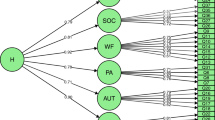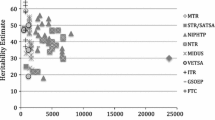Abstract
Prior behavioral genetic studies in positive psychology were entirely based on data from Western democracies, leaving the question open whether the magnitude of genetic effects on well-being indicators is similar in substantially different societal contexts. The aim of this study, therefore, was to investigate the structure of the genetic and environmental influences on happiness, life satisfaction, meaning in life, optimism, sense of coherence, and general well-being in a non-Western sample. Altogether, 100 monozygotic and 36 same-sex dizygotic twin pairs from Hungary (73 % female; Mage = 43 years, SD = 16 years) participated in the survey. Univariate classical twin modeling (ACE analysis) was performed using structural equation models. Heritability estimates of the positive psychological variables were largely variable, ranging from 0 % (happiness and meaning in life) to 67 % (life satisfaction). Also, estimates for the influence of common environment fell between 0 % (life satisfaction, sense of coherence, and well-being) and 60 % (meaning in life). Unshared environmental influences however, explained a moderate variance of all investigated variables (33–62 %). Most results were in line with previous findings from Western countries; however, some notable differences—e.g., lower hereditary influence for happiness or more robust role of shared environmental effects for optimism—were also established. These findings suggest that the communist and post-communist legacy did not produce drastic differences in the structure of heritability and environmental influences as compared to countries with longer traditions of democracy and economic prosperity.
Similar content being viewed by others
References
Antonovsky, A. (1991). The structural sources of salutogenic strengths. In C. L. Cooper, & R. Payne (Eds.), Personality and stress: Individual differences in the stress process (pp. 67–104). Chichester: John Wiley & Sons.
Antonovsky, A. (1993). The structure and properties of the Sense of Coherence Scale. Social Science and Medicine, 36(6), 725–733. doi:10.1016/0277-9536(93)90033-z.
Bech, P., Gudex, C., & Johansen, K. S. (1996). The WHO (ten) well-being index: validation in diabetes. Psychotherapy and Psychosomatics, 65(4), 183–190. doi:10.1159/000289073.
Bérdi, M., & Köteles, F. (2010). Az optimizmus mérése: az Életszemlélet Teszt átdolgozott változatának (LOT–R) pszichometriai jellemzői hazai mintán [The measurement of optimism: the psychometric properties of the Hungarian version of the Revised Life Orientation Test (LOT–R)]. Magyar Pszichológiai Szemle, 65(2), 273–294. doi:10.1556/MPSzle.65.2010.2.7.
Boehm, J. K., & Kubzansky, L. D. (2012). The heart's content: the association between positive psychological well-being and cardiovascular health. Psychological Bulletin, 138(4), 655–691. doi:10.1037/a0027448.
Bollen, K. A., & Stine, R. A. (1992). Bootstrapping goodness-of-fit measures in structural equation models. Sociological Methods & Research, 21(2), 205–229. doi:10.1177/0049124192021002004.
Caprara, G. V., Fagnani, C., Alessandri, G., Steca, P., Gigantesco, A., Cavalli Sforza, L. L., et al. (2009). Human optimal functioning: the genetics of positive orientation towards self, life, and the future. Behavior Genetics, 39(3), 277–284. doi:10.1007/s10519-009-9267-y.
Carver, C. S., & Scheier, M. F. (2014). Dispositional optimism. Trends in Cognitive Sciences, 18(6), 293–299. doi:10.1016/j.tics.2014.02.003.
Diener, E., Emmons, R. A., Larsen, R. J., & Griffin, S. (1985). The Satisfaction with Life Scale. Journal of Personality Assessment, 49(1), 71–75. doi:10.1207/s15327752jpa4901_13.
Erdos, M. B. (2010). Cha(lle)nge. The legacy of state socialism in Hungary: a discourse analysis. Europolis, 4(1), 73–99.
Franz, C. E., Panizzon, M. S., Eaves, L. J., Thompson, W., Lyons, M. J., Jacobson, K. C., et al. (2012). Genetic and environmental multidimensionality of well- and ill-being in middle aged twin men. Behavior Genetics, 42(4), 579–591. doi:10.1007/s10519-012-9538-x.
Hatemi, P. K., Medland, S. E., Klemmensen, R., Oskarsson, S., Littvay, L., Dawes, C. T., et al. (2014). Genetic influences on political ideologies: twin analyses of 19 measures of political ideologies from five democracies and genome-wide findings from three populations. Behavior Genetics, 44(3), 282–294. doi:10.1007/s10519-014-9648-8.
Jeges, S., & Varga, K. (2006). Unravelling the mystery of the sense of coherence. European Journal of Mental Health, 1(1), 45–71. doi:10.1556/EJMH.1.2006.1-2.3.
Konkolÿ Thege, B., Martos, T., Skrabski, Á., & Kopp, M. (2008). A Rövidített Stressz és Megküzdés Kérdőív élet értelmességét mérő alskálájának (BSCI-LM) pszichometriai jellemzői [Psychometric properties of the Life Meaning Subscale from the Brief Stress and Coping Inventory (BSCI-LM)]. Mentálhigiéné és Pszichoszomatika, 9(3), 243–261. doi:10.1556/Mental.9.2008.3.4.
Konkolÿ Thege, B., Urbán, R., & Kopp, M. (2013). Four-year prospective evaluation of the relationship between meaning in life and smoking status. Substance Abuse Treatment, Prevention, and Policy, 8(1), 8, doi:10.1186/1747-597X-8-8.
Krause, N. (2007). Longitudinal study of social support and meaning in life. Psychology and Aging, 22(3), 456–469. doi:10.1037/0882-7974.22.3.456.
Kyvik, K. O., Green, A., & Beck-Nielsen, H. (1995). The new Danish twin register: establishment and analysis of twinning rates. International Journal of Epidemiology, 24(3), 589–596. doi:10.1093/ije/24.3.589.
Littvay, L., Métneki, J., Tárnoki, Á. D., & Tárnoki, D. L. (2013). The Hungarian Twin Registry. Twin Research and Human Genetics, 16(Special Issue 01), 185–189. doi:10.1017/thg.2012.76.
Martos, T., Sallay, V., Désfalvi, J., Szabó, T., & Ittzés, A. (2014). Az Élettel Való Elégedettség Skála magyar változatának (SWLS-H) pszichometriai jellemzői [Psychometric characteristics of the Hungarian version of the Satisfaction with Life Scale (SWLS-H)]. Mentálhigiéné és Pszichoszomatika, 15(3), 289–303. doi:10.1556/Mental.15.2014.3.9.
Medland, S. E., & Hatemi, P. K. (2009). Political science, biometric theory, and twin studies: a methodological introduction. Political Analysis, 17(2), 191–214. doi:10.1093/pan/mpn016.
Nes, R. (2010). Happiness in behaviour genetics: findings and implications. Journal of Happiness Studies, 11(3), 369–381. doi:10.1007/s10902-009-9145-6.
Peterson, C. (2008). What is positive psychology, and what is it not? https://www.psychologytoday.com/blog/the-good-life/200805/what-is-positive-psychology-and-what-is-it-not. Accessed 06. 08. 2015.
Pikó, B. F. (2001). A demokrácia, a diktatúra és a posztszocializmus társadalomlélektana [Social psychology of democracy, dictatorship and postsocialism]. Valóság, 43, 12–21.
Pikó, B. F. (2002a). Az alkoholfogyasztás és alkoholizmus szociológiája [Sociology of alcohol consumption and alcoholism]. In B. F. Pikó (Ed.), A deviáns magatartás szociológiai alapjai és megjelenési formái a modern társadalomban (pp. 29–140). Szeged: JatePress.
Pikó, B. F. (2002b). Socio-cultural stress in modern societies and the myth of anxiety in Eastern Europe. Administration and Policy in Mental Health, 29(3), 275–280. doi:10.1023/A:1015199727651.
Rahe, R. H., & Tolles, R. L. (2002). The Brief Stress and Coping Inventory: a useful stress management instrument. International Journal of Stress Management, 9(2), 61–70. doi:10.1023/a:1014950618756.
Rietveld, C. A., Cesarini, D., Benjamin, D. J., Koellinger, P. D., De Neve, J.-E., Tiemeier, H., et al. (2013). Molecular genetics and subjective well-being. Proceedings of the National Academy of Sciences, 110(24), 9692–9697. doi:10.1073/pnas.1222171110.
Robinson, A., & Acemoglu, R. (2012). Why nations fail? The origins of power, prosperity and poverty. New York: Crown Publishers.
Ryan, R. M., & Deci, E. L. (2001). On happiness and human potentials: a review of research on hedonic and eudaimonic well-being. Annual Review of Psychology, 52, 141–166. doi:10.1146/annurev.psych.52.1.141.
Scheier, M. F., Carver, C. S., & Bridges, M. W. (1994). Distinguishing optimism from neuroticism (and trait anxiety, self-mastery, and self-esteem): a reevaluation of the Life Orientation Test. Journal of Personality and Social Psychology, 67(6), 1063–1078. doi:10.1037/0022-3514.67.6.1063.
Seligman, M. E., & Csikszentmihalyi, M. (2000). Positive Psychology. An Introduction. American Psychologist, 55(1), 5–14. doi:10.1037/0003-066X.55.1.5.
Sheldon, K. M., & King, L. (2001). Why positive psychology is necessary. American Psychologist, 56(3), 216–217. doi:10.1037/0003-066X.56.3.216.
Skrabski, A., Kopp, M., & Kawachi, I. (2003). Social capital in a changing society: cross sectional associations with middle aged female and male mortality rates. Journal of Epidemiology and Community Health, 57(2), 114–119. doi:10.1136/jech.57.2.114.
Sprangers, M. A., Bartels, M., Veenhoven, R., Baas, F., Martin, N. G., Mosing, M., et al. (2010). Which patient will feel down, which will be happy? The need to study the genetic disposition of emotional states. Quality of Life Research, 19(10), 1429–1437.
Steger, M. F., Hicks, B. M., Krueger, R. F., & Bouchard, T. J. (2011). Genetic and environmental influences and covariance among meaning in life, religiousness, and spirituality. The Journal of Positive Psychology, 6(3), 181–191. doi:10.1080/17439760.2011.569172.
Susánszky, É., Konkolÿ Thege, B., Stauder, A., & Kopp, M. (2006). A WHO Jól-lét kérdőív rövidített (WBI-5) magyar változatának validálása a hungarostudy 2002 országos lakossági egészségfelmérés alapján [validation of the short (5-item) version of the WHO Well-being Scale based on a Hungarian representative health survey (Hungarostudy 2002)]. Mentálhigiéné és Pszichoszomatika, 7(3), 247–255. doi:10.1556/Mental.7.2006.3.8.
Author information
Authors and Affiliations
Corresponding author
Ethics declarations
Disclosure of Potential Conflicts of Interest
The study was supported by Medexpert Ltd. The first author also gratefully acknowledges the financial support of the Norlien Foundation and the IMPART program (Intersections of Mental Health Perspectives in Addictions Research Training) received while working on this paper.
Ethical Approval
All procedures performed in this study were in accordance with the ethical standards of the institutional research committee and with the 1964 Helsinki declaration and its later amendments.
Informed Consent
Informed consent was obtained from all individual participants included in the study.
Additional information
Barna Konkolÿ Thege and Levente Littvay contributed equally to this paper.
Rights and permissions
About this article
Cite this article
Konkolÿ Thege, B., Littvay, L., Tarnoki, D.L. et al. Genetic and Environmental Effects on Eudaimonic and Hedonic Well-Being: Evidence from a Post-Communist Culture. Curr Psychol 36, 84–89 (2017). https://doi.org/10.1007/s12144-015-9387-x
Published:
Issue Date:
DOI: https://doi.org/10.1007/s12144-015-9387-x




